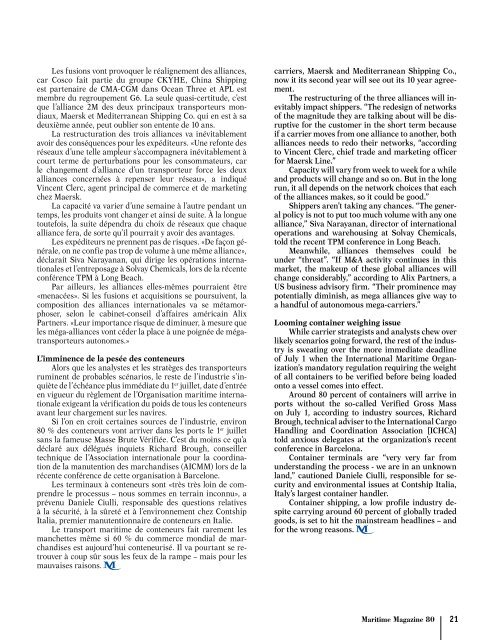Create successful ePaper yourself
Turn your PDF publications into a flip-book with our unique Google optimized e-Paper software.
Les fusions vont provoquer le réalignement des alliances,<br />
car Cosco fait partie du groupe CKYHE, China Shipping<br />
est partenaire de CMA-CGM dans Ocean Three et APL est<br />
membre du regroupement G6. La seule quasi-certitude, c’est<br />
que l’alliance 2M des deux principaux transporteurs mondiaux,<br />
Maersk et Mediterranean Shipping Co. qui en est à sa<br />
deuxième année, peut oublier son entente de 10 ans.<br />
La restructuration des trois alliances va inévitablement<br />
avoir des conséquences pour les expéditeurs. «Une refonte des<br />
réseaux d’une telle ampleur s’accompagnera inévitablement à<br />
court terme de perturbations pour les consommateurs, car<br />
le changement d’alliance d’un transporteur force les deux<br />
alliances concernées à repenser leur réseau», a indiqué<br />
Vincent Clerc, agent principal de commerce et de marketing<br />
chez Maersk.<br />
La capacité va varier d’une semaine à l’autre pendant un<br />
temps, les produits vont changer et ainsi de suite. À la longue<br />
toutefois, la suite dépendra du choix de réseaux que chaque<br />
alliance fera, de sorte qu’il pourrait y avoir des avantages.<br />
Les expéditeurs ne prennent pas de risques. «De façon générale,<br />
on ne confie pas trop de volume à une même alliance»,<br />
déclarait Siva Narayanan, qui dirige les opérations internationales<br />
et l’entreposage à Solvay Chemicals, lors de la récente<br />
conférence TPM à Long Beach.<br />
Par ailleurs, les alliances elles-mêmes pourraient être<br />
«menacées». Si les fusions et acquisitions se poursuivent, la<br />
composition des alliances internationales va se métamorphoser,<br />
selon le cabinet-conseil d’affaires américain Alix<br />
Partners. «Leur importance risque de diminuer, à mesure que<br />
les méga-alliances vont céder la place à une poignée de mégatransporteurs<br />
autonomes.»<br />
L’imminence de la pesée des conteneurs<br />
Alors que les analystes et les stratèges des transporteurs<br />
ruminent de probables scénarios, le reste de l’industrie s’inquiète<br />
de l’échéance plus immédiate du 1 er juillet, date d’entrée<br />
en vigueur du règlement de l’Organisation maritime internationale<br />
exigeant la vérification du poids de tous les conteneurs<br />
avant leur chargement sur les navires.<br />
Si l’on en croit certaines sources de l’industrie, environ<br />
80 % des conteneurs vont arriver dans les ports le 1 er juillet<br />
sans la fameuse Masse Brute Vérifiée. C’est du moins ce qu’a<br />
déclaré aux délégués inquiets Richard Brough, conseiller<br />
technique de l’Association internationale pour la coordination<br />
de la manutention des marchandises (AICMM) lors de la<br />
récente conférence de cette organisation à Barcelone.<br />
Les terminaux à conteneurs sont «très très loin de comprendre<br />
le processus – nous sommes en terrain inconnu», a<br />
prévenu Daniele Ciulli, responsable des questions relatives<br />
à la sécurité, à la sûreté et à l’environnement chez Contship<br />
Italia, premier manutentionnaire de conteneurs en Italie.<br />
Le transport maritime de conteneurs fait rarement les<br />
manchettes même si 60 % du commerce mondial de marchandises<br />
est aujourd’hui conteneurisé. Il va pourtant se retrouver<br />
à coup sûr sous les feux de la rampe – mais pour les<br />
mauvaises raisons.<br />
carriers, Maersk and Mediterranean Shipping Co.,<br />
now it its second year will see out its 10 year agreement.<br />
The restructuring of the three alliances will inevitably<br />
impact shippers. “The redesign of networks<br />
of the magnitude they are talking about will be disruptive<br />
for the customer in the short term because<br />
if a carrier moves from one alliance to another, both<br />
alliances needs to redo their networks, “according<br />
to Vincent Clerc, chief trade and marketing officer<br />
for Maersk Line.”<br />
Capacity will vary from week to week for a while<br />
and products will change and so on. But in the long<br />
run, it all depends on the network choices that each<br />
of the alliances makes, so it could be good.”<br />
Shippers aren’t taking any chances. “The general<br />
policy is not to put too much volume with any one<br />
alliance,” Siva Narayanan, director of international<br />
operations and warehousing at Solvay Chemicals,<br />
told the recent TPM conference in Long Beach.<br />
Meanwhile, alliances themselves could be<br />
under “threat”. “If M&A activity continues in this<br />
market, the makeup of these global alliances will<br />
change considerably,” according to Alix Partners, a<br />
US business advisory firm. “Their prominence may<br />
potentially diminish, as mega alliances give way to<br />
a handful of autonomous mega-carriers.”<br />
Looming container weighing issue<br />
While carrier strategists and analysts chew over<br />
likely scenarios going forward, the rest of the industry<br />
is sweating over the more immediate deadline<br />
of July 1 when the International Maritime Organization’s<br />
mandatory regulation requiring the weight<br />
of all containers to be verified before being loaded<br />
onto a vessel comes into effect.<br />
Around 80 percent of containers will arrive in<br />
ports without the so-called Verified Gross Mass<br />
on July 1, according to industry sources, Richard<br />
Brough, technical adviser to the International Cargo<br />
Handling and Coordination Association [ICHCA]<br />
told anxious delegates at the organization’s recent<br />
conference in Barcelona.<br />
Container terminals are “very very far from<br />
understanding the process - we are in an unknown<br />
land,” cautioned Daniele Ciulli, responsible for security<br />
and environmental issues at Contship Italia,<br />
Italy’s largest container handler.<br />
Container shipping, a low profile industry despite<br />
carrying around 60 percent of globally traded<br />
goods, is set to hit the mainstream headlines – and<br />
for the wrong reasons.<br />
Maritime Magazine 80 21


